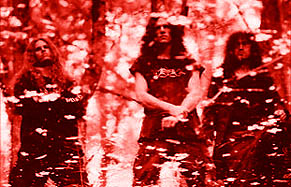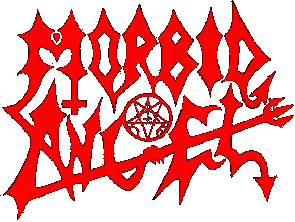

|
|
|
|
|
|
|
|
|
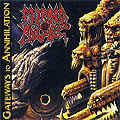
Despite the most lofty and well-meaning of intentions, I don’t think it worked. But we did share a hardy chuckle at the sheer pretentiousness of the whole project – nothing more than an egomaniacal excursion into the drug-heightened recesses of figurehead Trey Azagthoth’s brain.
These days, Trey has learned to play nice with others, seeking the creative involvement of his highly regarded band mates to produce the better than expected Gateways to Annihilation. Dubbed by some as Domination, Part II, a label that fits fairly comfortably due to its predominantly mid-paced tempo and “slimy” guitar tone, Gateways almost succumbs to the musical cliché of ‘the best of the old and the best of the new.’ That is, if you conveniently forget that the first three Morbid Angel albums ever existed.
As touched upon above, Gateways is the collaborative effort of a band, not an individual, and it is much better off as a result. In fact, Gateways exceeds Formulas in every conceivable way – cleaner production, more well-rounded songwriting, and a more sustained effort by each individual. Trey is still the primary songwriter, which should come as no surprise, although he did allow the inclusion of the throw-away instrumental "Awakening” and the closer “God of the Forsaken,” both written by Hate Eternal bad ass Erik Rutan. Plus, he relinquishes a great deal of the lyrical duties, allowing vocalist and bassist Steve Tucker to pen some death metal ditties – paeans to the Ancient Ones supplanted in favor of anti-Christian rhetoric reminiscent of earlier releases.
Rutan is still one of the few living six-stringers whose presence manages to transform Azagthoth into an even greater guitarist, elevating the guitar interchanges to a loftier supercilious level of creative expression. And while Pete Sandoval retains his revered status as a progenitor of death metal percussion, he is one who refuses to rest upon his laurels, his subtle fills and time changes on par with his inhuman ability to blast, even managing to register some of his fastest beats per minute on the double-bass during “To the Victor the Spoils” and “Opening of the Gates.”
But the greatest improvement lies with Tucker. Sure, his bass is still buried in the mix, but I’ll be goddamned if the man hasn’t been possessed by the ghost of former vocalist Dave Vincent, Tucker’s voice possessing a dexterity nowhere to be found on the previous effort. Of course, he is no longer relegated to spewing out lyrics in an ancient Sumarian tongue, a challenge that would even reduce an orator on the level of William F. Buckley to a total mushmouth. In short, Tucker’s presence makes “Gateways” a much better album, and admission I truly believed I would never be able to make in good conscience.
Expecting Morbid
Angel to release another Altars of Madness or Covenant is
like anticipating the next Metallica album to sound like Master of Puppets
or the upcoming Slayer platter to possess the unbridled intensity of Reign
in Blood. In other words, it ain’t gonna happen. Ever. So, with all
due respect, get over it. Gateways to Annihilation is not an instant
classic, but it is a testament to a band with the intestinal fortitude
to rebound from a less-than-stellar effort to create the best album it
could at this point in its lineage.
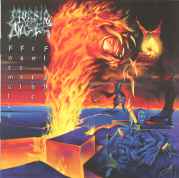
Yet while Tucker may, in some ways, appear to be Trey Azagthoth's lackey - a mouthpiece for his "Cutha Hymns" - I wouldn't call this a "bend-over-and-take-it-up-the-ass" sort of job (which, sadly, seems to be Vincent's line of work these days in his wife's sadistic outfit, the Genitorturers). Tucker, while a run-of-the-mill death metal vocalist, is impressive in his vocal skills, possessing the unique ability to growl ancient Sumarian lyrics at warp speed.
To me, however, that's indicative, at least on some level, of the problems I have with Formulas. Sure, the intense lyrical focus and the images it evokes reflects a strict and intense adherence to a unifying theme, which holds the album together on a conceptual level. At the same time, however, this unwavering concentration severely limits the output and order of the CD. Take, for example, the final three tracks: "Ascent Through the Spheres," Hymnos Rituales De Guerra" and "Trooper." All three are instrumentals, "hymns . . . to lift up and give praise to the Most Ancient of Days." I guess I can see what Azagthoth had in mind, wanting this to be not merely a collection of songs, but an experience. But Azagthoth's instrumentals have always worked better either as a juxtaposition sandwiched between two similarly paced songs, such as "Disturbance in the Great Slumber" from Formulas, or as an extended, orchestral introduction to a song, like on Blessed are the Sick's "Doomsday Celebration." In short, the theme comes across as too forced, which tends to upset the flow that I imagine Azagthoth desired when he put this together.
Regardless, the fact remains: this is a Morbid Angel recording. While it may be disappointing on some levels, it can't be bad. And, as always, it's innovative as hell, once again expanding the boundaries of death metal without diluting it. My only hope is that next time around, Trey will once again open up the creative output of the album to his other band members, improving upon what can only be seen as a new beginning for the band.
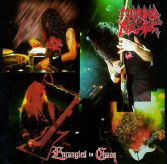
Yet the live album is not always an accurate reflection of a band's mojo, since it, too, can be manipulated from behind the glass of a recording studio. In fact, studio overdubs and additional mixing are not unusual even for albums recorded on a real stage with a real crowd. So where does this leave Morbid Angel, long considered to be one of the most musically complex of all metal bands? Does the band's death-grind nuclear assault transfer well to the live setting, and if so, can we trust it as an accurate depiction of the Morbid Angel live experience? Quelch your concerns, for not only does Entangled in Chaos meet and exceed fan expectations, it also uses no studio overdubs, which means that the raw and violent fury that propels the swirling chaos of the band's oeuvre on this recording is a dead-on reflection of Morbid Angel's explosive and jaw dropping live power.
Entangled could easily be the live presentation of a greatest hits package culled from the band's first four genre expanding albums, although guitarist and mastermind Trey Azagthoth claims it is nothing more than a typical live set. What is merely typical for Morbid Angel, however, is more often than not an unsurmountable plateau that serves as some constantly flubbed litmus test. From the opening riffs of "Immortal Rites" to the set's closer, "Dominate," the band consistently and unabashadly demonstrates its unique chemistry that it shared up to the release of Domination.
On a more melancholy note, this recording also serves as vocalist and bassist David Vincent's swansong, as creative differences with Azagthoth, among other issues, drove him to the leather and gagballs of his wife, Gen, leader of the whips and chains wielding Genitorturers. While playing bass with his new outfit may be papa's brand new bag, Vincent cannot be dismissed for what he was - a formidable focal point for the band with an imposing stage presence and the coolest voice in death metal.
Beneath the rubric
of heavy metal live albums exists a dirth of mediocre releases from subpar
bands with enough studio know-how to spitshine their product into some
sort of pseudolegitimacy. Fortunately, Morbid Angel has no need to
cheat the listener's ears. Let it serve as a brutal calling card
for one of the greatest and most innovative bands in extreme metal.
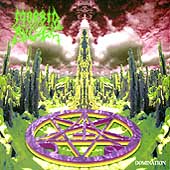
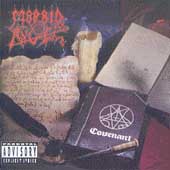
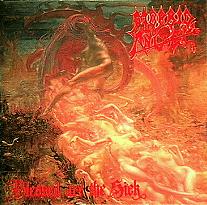
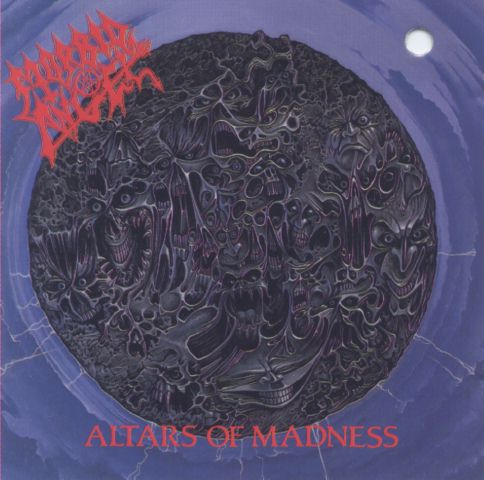
Altars of Madness is the sensory equivalent of the self mutilation that adorns guitarist and founder Trey Azagthoth’s arm on his photo inside the album’s sleeve. Carving pentagrams into his forearm with a razor sharp blade wasn’t one of the healthiest means to channel the chaotic swirl of life’s emotional turbulence, yet it was an effort at catharsis nonetheless. And while death metal fans are ecstatic that Trey didn’t literally drain himself before moving on to a more self-affirming philosophy – Cthulu and his cronies peppered with the self help speak of Tony Robbins – this album serves as a reminder of the toxic depths of Azagthoth’s, as well as the band's, imposing presence and creativity.
Quite frankly, Altars is one of my all time favorite death metal debuts. Somewhat musically and lyrically reminiscent of Slayer’s Show No Mercy – although I would contend that Altars pummels it into submission – Altars offers up nine slabs of sheer satanic mayhem. And for all of Azagthoth’s six-string pyrotechnics, what really stands out is how tight the band works as a unit: Richard Brunelle compliments his counterpart’s aggressive playing style, Pete Sandoval shows the raw talent that he has honed to become the greatest drummer working in extreme music today, and David Vincent (R.I.P., from Morbid Angel, anyway) spits out his lyrical venom while providing an intimidating and resounding thud to the rhythm section.
The only thing that some may find detracting from the album’s greatness is its lack of variety. The band rarely moves slower than a thousand miles per hour. And while I could respond, “Jesus, people, this is death metal,” I would quickly be put in my place by those who would rightfully point out the many moods (and speeds) of the band on its subsequent releases. But excessive speed is not monotony, at least not in this particular case. The intricate time changes and godsized riffs keep things too interesting to be lulled into some sort of listener’s complacency.
I firmly believe that a true fan of death metal should not be without this release in his or her CD collection. There are no excuses. If you still aren’t convinced, (imagine that I’m saying this part in a growling and intimidating death metal voice) MAY CTHULU RAVAGE YOUR SOUL! Or something like that.
